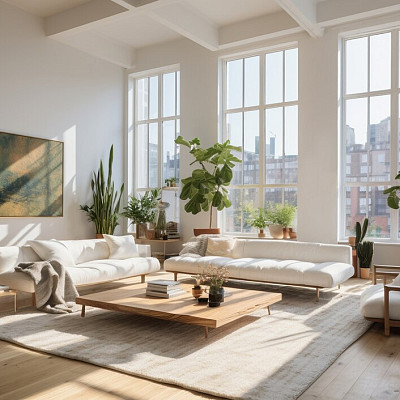Purchasing a Studio Apartment in Thailand: Pros and Cons
Buying a studio apartment in Thailand is a significant decision that requires financial preparation and an understanding of the unique aspects of this property type. To make the best choice, it's important to weigh the pros and cons of owning a studio apartment in Thailand.

CONTENT:
- Advantages of Buying a Studio in Thailand
- Cost and Utilities
- Area and Layout
- Maintenance and Amenities
- Location
- High ROI
- Disadvantages of Buying a Studio in Thailand
- Accommodation Rules
- Renting a Studio in Thailand
- Difficulties in Getting a Loan
- Ownership Percentage for Foreigners
- Residence Permit When Purchasing Real Estate in Thailand
- Conclusions
ADVANTAGES OF BUYING A STUDIO IN THAILAND
A studio apartment is a budget-friendly, open-plan living space with no internal walls other than those dividing the bathroom or shower area.
The advantages of purchasing a studio apartment in Thailand include:
Cost and Utilities
On average, a studio apartment in Thailand costs around 30% less than a one-bedroom apartment. This is due to the smaller size of studios, typically ranging from 23 to 40 square meters. For example, the price of a studio apartment of around 30 square meters in a new development starts at approximately $100,000, whereas one-bedroom apartments begin at around $130,000.
Studio apartments are located in condominiums that have centralized utilities. The monthly maintenance costs for a studio are approximately $70-80, which can be easily recouped within 1-2 days of rental income. Annual maintenance costs are typically covered in a few weeks of tenant occupancy. Owners are only responsible for their unit, while the management company, funded by an annual fee, takes care of the condominium’s overall maintenance, such as landscaping, building upkeep, and addressing utility issues.
Area and Layout
In Thailand, studio apartments as small as 23 square meters are common. Most studios feature a built-in kitchen, a living area, and a bedroom in a single space, along with a bathroom and toilet. This layout is ideal for those who appreciate minimalism and ease of maintenance, as keeping the space tidy is simple.
Maintenance and Amenities
For those who don’t reside in Thailand, the condo’s management company will handle all studio apartment maintenance, including utility payments, cleaning, and changing linens after tenant stays.
Studio owners also enjoy common condo amenities, such as a gym, laundry facilities, parking, swimming pool, sauna, gardens, concierge services, 24/7 security, and video surveillance. Mail is delivered directly to your apartment, and parcels from couriers are handled by the condo staff.
Location
Studio apartments are often located in residential complexes within areas with well-developed infrastructure. Shopping malls, stores, restaurants, cafes, metro stations, and bus stops are typically within walking distance. From these condos, it’s convenient to reach major city attractions and workplaces.
High ROI
Investing in a studio apartment in high-demand areas like Pattaya, Bangkok, or Phuket can provide steady rental income. These locations are popular with both long-term tenants and tourists, allowing for year-round rental opportunities. Thanks to Thailand’s favorable climate and constant flow of tourists, the demand for studio rentals remains strong, with annual returns reaching 8-10% in popular areas.
Disadvantages of Buying a Studio in Thailand
Despite the many advantages, buying a studio apartment in Thailand comes with a few drawbacks. Let's outline the key ones:
Accommodation Rules
Potential buyers with pets should reconsider purchasing a studio apartment in Thailand for their residence. Most apartment buildings do not allow pets. Additionally, leaving personal belongings in public areas, such as bicycles, strollers, or other items, is usually prohibited. These items cannot be stored in stairwells or porches.
Renting a Studio in Thailand
Before buying a studio for rental purposes, it’s essential to review the existing rental agreements associated with the property, if any. The previous owner might have signed a guaranteed rental agreement, meaning the management company would be required to continue honoring the terms of that contract for a set period.
Difficulties in Getting a Loan
Obtaining a mortgage for a studio apartment can be challenging for non-residents in Thailand. Local banks rarely issue mortgage loans to non-residents, with loans primarily available to Thai residents or foreign public sector workers.
Ownership Percentage for Foreigners
Thai law permits foreigners to own only 49% of the total units in a condominium. As a result, you may find that foreign ownership quotas have already been filled, preventing you from purchasing a studio in a particular building. However, foreigners often have more options at the early stages of new developments.
Residence Permit and Citizenship
While foreigners can purchase studio apartments in any region of Thailand, owning property does not grant automatic residency or citizenship rights.




